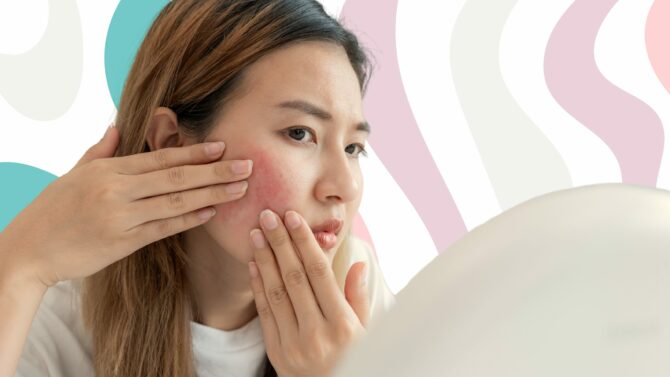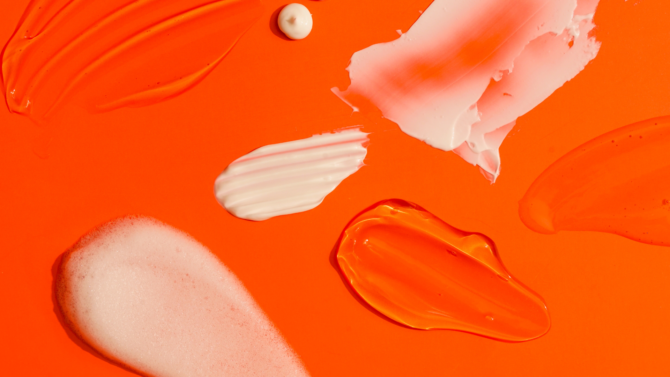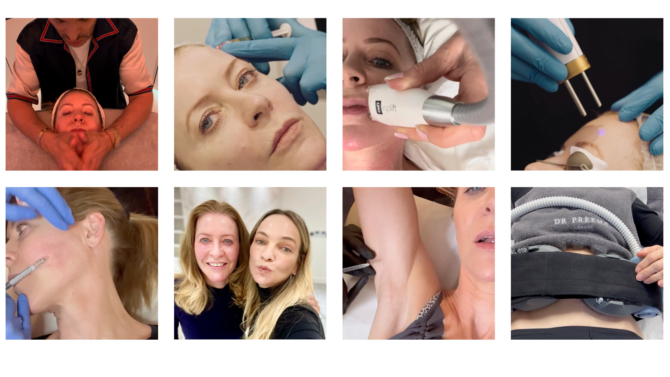Why is my skin dry even when I moisturise?
If you asked most women what their favourite skincare product is “moisturiser” would probably be the top answer, but there’s a conundrum when it comes to moisturiser and dry skin, and something that is highly debated among experts.
Undoubtedly moisturisers relieve the feeling of sore, dry skin, but there is a theory that repeated use over time can actually create a self-perpetuating cycle. Your skin is dry so you apply moisturiser but then your skin becomes “lazy” and forgets how to hydrate itself. You become more and more reliant on moisturiser.
Healthy, flourishing skin, with a non-compromised barrier, keeps itself moist by producing ‘natural moisturising factors’ (NMFs) so it should not be dry. The goal really is to address your skin health and function and target the underlying cause of the dryness rather than to keep putting a plaster on the problem. That being said there are a wide range of products in the category of moisturisers and their effectiveness will depend on the ingredients they contain and their formulation. Hydrated skin is healthy skin and there are products that not only feel nice but also offer effective support to your skin in keeping hydrated.
What causes dry rough skin?
There are a number of factors that cause dry skin and its severity will vary depending on whether or not you have dermatitis or a condition such as eczema or psoriasis.
Extremely dry skin is known medically as “dermatitis” and there are various different forms of this but the main ones are:
Contact dermatitis – caused by a reaction when your skin comes into contact with an irritant, such as a soap, chemical agent, washing powder or other detergent, that causes an inflammatory response. Contact dermatitis can also be known as “allergic contact dermatitis” when people have an actual allergy to a substance. Latex would be an example.
Atopic dermatitis – Atopic dermatitis is more commonly known as eczema. This condition is a chronic inflammation of the skin and often runs in families meaning there is a genetic factor to it. It is often caused or made worse by abnormal reactions to irritants, food and environmental allergens causing the skin to become red, flaky and itchy. Atopic dermatitis is most likely to appear on the face, elbows and the backs of the knees.
For most people, however, dry skin is most prevalent during the change of seasons, in the colder winter months in particular. This is because our skin is subjected to constant changes between the cold and wind outside and the central heating indoors, which can all strip t of moisture. Taking hot baths and showers frequently can also dry out the skin as can swimming, especially in chlorinated pools. Another factor that contributes to dry skin is the products we use. Things like soaps, detergents, hand washes, hand sanitisers and shampoos are all designed to clean and remove dirt but at the same time they also get rid of the skin’s naturally moisturising oils, leading it to become dry.
How to soothe dry skin on the face?
Although becoming over reliant on moisturisers can leave you stuck in a vicious cycle, for most people a moisturising product would be a first choice when it comes to dry skin.
Moisturised, hydrated skin feels nice and looks smoother and plumper. It also reduces the appearance of lines and wrinkles which are more prominent and visible on dry skin. Most moisturisers are made up largely of water and this is why they feel good and offer instant relief. They are simply providing some much-needed hydration to dry skin cells. They feel nurturing and soothing to apply as they usually have a lovely texture and often smell nice, so it’s no wonder many women love their moisturiser.
There are different ways types of ingredients in moisturisers work. Moisturisers containing humectants like glycerine, urea and hyaluronic acid, work by attracting water into the outer layers of skin while occlusives, such as oils and lanolin, form a film on the skin to keep moisture in and stop it escaping into the outside air. Emollients like oils, shea butter and lanolin, smooth over the surface of the skin to fill in the tiny cracks in the skin’s barrier .
Hydrating serums have also become more popular in recent years. This is because they usually contain hyaluronic acid, a powerful water-attracting molecule that helps put moisture back into your skin. Also unlike most moisturisers, which tend to sit on the top of the skin, HA serums soak in and work to moisturise from within the layers of the skin by attracting water almost like a sponge.
Why is the skin around my mouth dry and flaky?
There are many reasons we get dry skin around our mouths but the most common cause is a change in outdoor temperature, especially when it becomes colder and there is a wind chill in the winter.
When our lips and mouth become dry most of us have a tendency to lick them in an attempt to moisturise them, but this only serves to make the problem worse and the skin becomes more dry and chapped.
Skin conditions such as eczema, psoriasis and dermatitis, in particular perioral dermatitis can all make skin around the sensitive mouth area more dry.
What skincare brand should I use for dry flaky skin?
There are so many brands out there that offer a solution to dry skin that there is no one-size-fits-all approach. Choosing the right products and brands that work for you will depend on a variety of factors such as your skin type; Personal preference i.e. whether you like a product that feels light and fresh or one that feels rich and creamy, with or without fragrance; What you want the product to do i.e. do you just want a moisturiser or are you looking for anti-ageing ingredients or SPF too?; How you want the product to make you feel i.e. do you want it to be pampering or are you more interested in result?; Your budget; Your ethical views about skincare i.e. do you want to only use brands that are vegan, environmentally conscious and cruelty free?; How much time and effort you want to put into your regime i.e. do you just want to get up an go with one product or do you want a selection of products that work in conjunction with one another? The list goes on.
There are thousands upon thousands of moisturisers to choose from however when it comes to problem dry skin there are a few that stand out. We like Superdrug vitamin E cream, Cerave Moisturising Cream for Dry to Very Dry Skin and Embyrolisse Lait-Crème Concentre Nourishing Moisturiser.
How do I prevent dry flaky skin?
Keeping your skin hydrated and functioning in a healthy way will help prevent dry skin. Drink plenty of water and use products which encourage skin barrier repair, exfoliation and skin cell turnover. These active products, such as retinols/vitamin A can be slightly irritating and drying at first which may seem counter intuitive but in the long term they can help your skin to function properly and not be so reliant on moisturiser. Protecting your skin in the sun by wearing SPF will also help keep it healthy and prevent damage which can inhibit its normal function. Hot baths and showers can also cause dry skin so limiting the time you spend in hot water can help. Also be mindful of chemicals and detergents that you use in all products from your washing powder to cleaning products, shampoos and soaps. These can all contribute to dry skin but there are plenty of less harsh, irritating, skin-friendly brands out there.
Why do I have eczema on my face?
Although eczema is a common skin condition, it’s exact cause is unknown. It tends to affect the face, hands and elbows in particular causing it to become red and itchy and dry. It is believed that there is a genetic tendency to develop the condition. Symptoms can unexpectedly flare up for no obvious reason, however, there are certain triggers that may impact it including: chemicals, detergents, soap or shampoo; infections with bacteria or viruses; inhaled irritants such as pollen or house dust mites; being stressed or run down; fluctuations in hormone levels i.e. before your period; and eating certain foods.
How can I treat dry rough skin?
Our skin is around 60 per cent water, but it can easily become dry. If the skin barrier (the outer layer of the skin, which shields our insides from the outside world) becomes damaged or ‘compromised’, it can lose water, causing it to become dry and rough in texture. The most effective way to treat dry skin is to restore healthy skin barrier function. In-clinic treatments such as peels, dermaplaning, laser resurfacing and hydro-facials can help remove dead layers of skin and encourage the skin to heal itself. At home using products containing active ingredients, such as vitamin A or acids such as glycolic acid, lactic acid or salicylic acid can help exfoliate the skin and help it to function healthily once more. There is a bit of persistence required and a period of discomfort to go through with some of these products but it’s worth the investment if you can persevere. Otherwise finding a good quality moisturiser or hyaluronic acid serum can help keep your skin more hydrated and supple. Also don’t forget to drink water – natures natural hydrator!
Are there any tweakments for dry and rough skin or should I use skincare?
If your skin has become red and sore from dry skin then your skincare practitioner or dermatologist may recommend an at-home approach using skincare before having treatment. If your skin is damaged and sore then more aggressive exfoliating treatments may not be recommended. LED light therapy is a soothing and healing treatment which can be beneficial. If the skin is dry and flaky but not cracked, bleeding or broken, the treatments that help to remove the dead cells on the outer layer of the skin can be really effective. These include things such as peels, dermaplaning, device-based treatments which use hydro-dermabrasion or things like laser resurfacing. Skincare can be extremely effective for tackling a multitude of skin concerns. For most effective results consult with a practitioner who can recommend the right products for you.
Home remedies for itching on the face and dry patches?
If you are looking for a natural, home remedy to relieve itching and dryness on the face there are a number of things you can use. Many people rave about the benefits of coconut oil, particularly massaged into the scalp for dry, flaky skin. Menthol is also another soothing essential oil that can calm itching. If your skin is really red and itching cooling it may help offer some relief. You can apply a cold wet cloth or an ice pack to the area for five to 10 minutes. If you are using an ice pack be careful to put a barrier, such as a thin soft towel between the ice pack and your skin as you don’t want an ice burn.
Other home remedies that have been backed up by studies and trials include applying a mixture of “colloidal oatmeal” or apple cider vinegar.
The oatmeal is mixed with water to create a sort of paste and is then applied to the skin to form a protective barrier and keep moisture in. It is thought to be both an anti-inflammatory and an anti-oxidant and has been shown to reduce dryness, intensity of itching and even roughness and scaling.
Apple cider vinegar is known for its disinfectant and antiseptic qualities. It contains acetic acid and can be diluted in water at a ratio of 1:1 and applied. This is particularly useful for an itchy scalp, according to the National Psoriasis Foundation.











 The Tweakments Chatbot
The Tweakments Chatbot